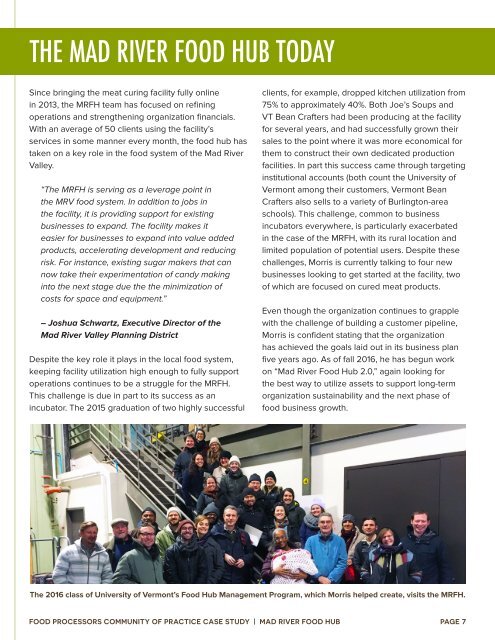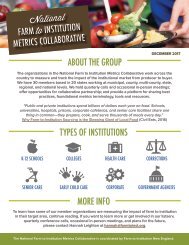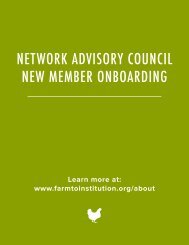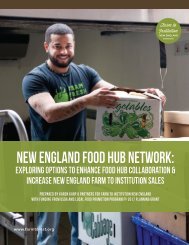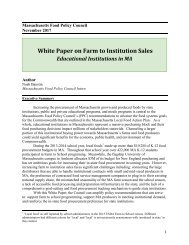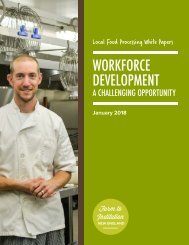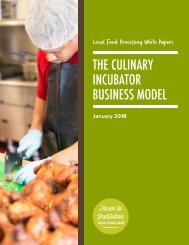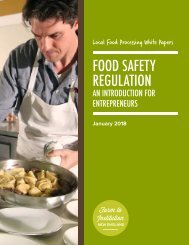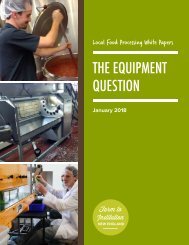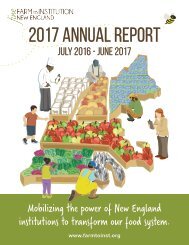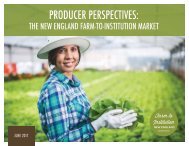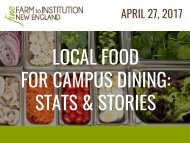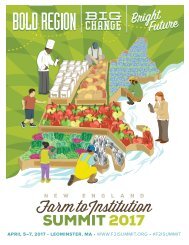Mad River Food Hub Case Study
You also want an ePaper? Increase the reach of your titles
YUMPU automatically turns print PDFs into web optimized ePapers that Google loves.
THE MAD RIVER FOOD HUB TODAY<br />
Since bringing the meat curing facility fully online<br />
in 2013, the MRFH team has focused on refining<br />
operations and strengthening organization financials.<br />
With an average of 50 clients using the facility’s<br />
services in some manner every month, the food hub has<br />
taken on a key role in the food system of the <strong>Mad</strong> <strong>River</strong><br />
Valley.<br />
“The MRFH is serving as a leverage point in<br />
the MRV food system. In addition to jobs in<br />
the facility, it is providing support for existing<br />
businesses to expand. The facility makes it<br />
easier for businesses to expand into value added<br />
products, accelerating development and reducing<br />
risk. For instance, existing sugar makers that can<br />
now take their experimentation of candy making<br />
into the next stage due the the minimization of<br />
costs for space and equipment.”<br />
– Joshua Schwartz, Executive Director of the<br />
<strong>Mad</strong> <strong>River</strong> Valley Planning District<br />
Despite the key role it plays in the local food system,<br />
keeping facility utilization high enough to fully support<br />
operations continues to be a struggle for the MRFH.<br />
This challenge is due in part to its success as an<br />
incubator. The 2015 graduation of two highly successful<br />
clients, for example, dropped kitchen utilization from<br />
75% to approximately 40%. Both Joe’s Soups and<br />
VT Bean Crafters had been producing at the facility<br />
for several years, and had successfully grown their<br />
sales to the point where it was more economical for<br />
them to construct their own dedicated production<br />
facilities. In part this success came through targeting<br />
institutional accounts (both count the University of<br />
Vermont among their customers, Vermont Bean<br />
Crafters also sells to a variety of Burlington-area<br />
schools). This challenge, common to business<br />
incubators everywhere, is particularly exacerbated<br />
in the case of the MRFH, with its rural location and<br />
limited population of potential users. Despite these<br />
challenges, Morris is currently talking to four new<br />
businesses looking to get started at the facility, two<br />
of which are focused on cured meat products.<br />
Even though the organization continues to grapple<br />
with the challenge of building a customer pipeline,<br />
Morris is confident stating that the organization<br />
has achieved the goals laid out in its business plan<br />
five years ago. As of fall 2016, he has begun work<br />
on “<strong>Mad</strong> <strong>River</strong> <strong>Food</strong> <strong>Hub</strong> 2.0,” again looking for<br />
the best way to utilize assets to support long-term<br />
organization sustainability and the next phase of<br />
food business growth.<br />
The 2016 class of University of Vermont’s <strong>Food</strong> <strong>Hub</strong> Management Program, which Morris helped create, visits the MRFH.<br />
FOOD PROCESSORS COMMUNITY OF PRACTICE CASE STUDY | MAD RIVER FOOD HUB PAGE 7


